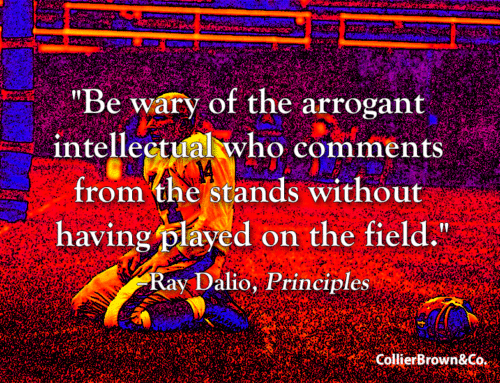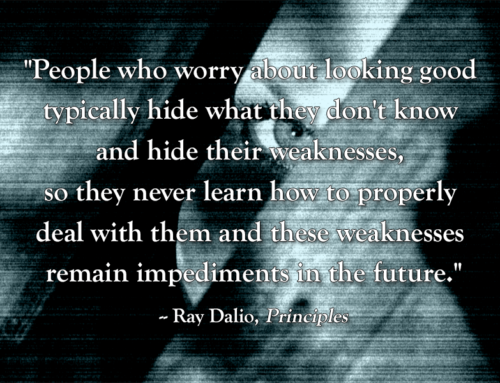Sometimes executives, and other managers, exhibit bad behavior. It happens. Managers are people, too. Occasionally, however, executives are abusive, in the same way that a few people are “abusive personality types.” As I said, managers are people, too.
With these abusive types we have come to expect raised voices, outrageous accusations, flushed faces, stern looks, pointing fingers, and cold hearts. What if you saw none of that hysterical behavior and got the same, or similar, results? It might be hard to recognize what’s really going on. It might seem impossible to reconcile some of the behaviors, results and sensory experiences. One could easily come away with a vague sense of “something is not quite right with this… perhaps it’s me. I wonder what I did wrong.” You are likely not the problem. However, you may be led to believe that you are.
This is a different form of abusive behavior. It’s related to the one we’re familiar with but it’s often quiet, even soft-spoken. It can have a “niceness” to it. It is, however, abusive in that its message is clear: “your ideas are no good, your ways are always suspect, and your voice will not be heard.”
I began to notice, and help executives with this particular form of abusiveness several years ago. What I finally figured out is that it stems from the exact same roots as “typical” abusive behavior. The differences are subtle, but very important: managers who are weak and/or detached from their work (they don’t really know what’s going on, or they don’t know what to do, and they have no vision for the future) are highly likely to demonstrate such “unacceptable behavior” (aka “bullsh*t”). The behavior is unacceptable because it creates unnecessary anxiety, anger, pain, and fear.
This all came together for me while reading Dr. Carl Alasko’s book, Emotional Bullshit, in 2009. This stealthy problem is made up of three common psychological dynamics: the “toxic trio” of denial, delusion, and blame. These three dynamics work together to: deny an essential fact of the matter, thus creating the delusional need for an alternate reality, to therefore blame and shift the responsibility to someone else and have no accountability. The goal is always a short-term gain while avoiding pain and conflict.
The weak and detached manager is in denial about their lack of understanding about what’s going on in the business or about what to do next, yet their job requires them to make some progress (short-term gain). They create an alternative reality where they have all the answers. This sets up the opportunity to blame others when things go wrong. And the cycle repeats itself. These are people who’s world is moving and changing faster than they are, who can’t or won’t keep up, who may not care anymore but still need the job.
| Activity | What it does | What you hear | Translation |
| Denial | Ignores or minimizes an essential fact – or a responsibility, then… | There is no problem. Everything is okay. You’re exaggerating. That issue doesn’t matter; it’s irrelevant. | So I don’t have to change anything. |
| Delusion | Creates an alternate (more favorable) reality, then… | Let me tell you what’s really true. Don’t believe what you see. Believe me. | This imaginary world I’ve created works for me. |
| Blame | Shifts the responsibility onto someone or something else | You’re the problem. I was forced to do it: I had no choice. Or, it just happened. Destiny willed it. | No one understands my true motives. Your accusations only make things worse. |
This can get confusing (OK, more confusing) because these weak and detached executives are often nice people – they’re just ineffective managers.
It’s not your job to fix them. You can’t. They won’t appreciate your efforts. You’ll likely get hurt if you try. Here are three things you can do to protect your long term interests:
- Seek clarity of expectations and assignments – They often give vague or conflicting assignments. Make sure you know what’s expected of you and when it’s expected.
- Never deliver bad news without at least one good recommendation to fix it – First, try not to be the one who has to deliver bad news to this person, ever. Sometimes that can’t be avoided. The problem is that they tend to affix a relationship – one you don’t want – between the message and the messenger.
- Do your job and get results – Understand what matters to your manager and deliver results accordingly. While this might seem obvious, please note that weak and detached managers are likely insecure and overcompensating. Remember, when things don’t go well, for whatever reason, they will look for someone to blame.
These will help. Really, no BS.
In Other Words…
“Most men would rather deny a hard truth than face it.” ― George R.R. Martin, A Game of Thrones
“The thing about denial is that it doesn’t feel like denial when it’s going on.” ― Georgina Kleege, Sight Unseen
“Speak when you are angry and you will make the best speech you will ever regret.” ― Ambrose Bierce
“I’m interested in the fact that the less secure a man is, the more likely he is to have extreme prejudice.” ― Clint Eastwood
“I’m a logician. No matter how wrong I am, I can always convince myself I am right. ” ― Jarod Kintz, Seriously delirious, but not at all serious
In The Word…
“Always learning and never able to arrive at a knowledge of the truth.” – 2 Timothy 3:7






